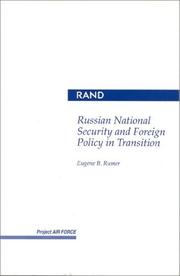| Listing 1 - 10 of 120 | << page >> |
Sort by
|

ISBN: 9780833016157 0833016156 Year: 1995 Publisher: Santa Monica (Calif.): RAND,
Abstract | Keywords | Export | Availability | Bookmark
 Loading...
Loading...Choose an application
- Reference Manager
- EndNote
- RefWorks (Direct export to RefWorks)
This study is an examination and assessment of critical trends in the evolution of Russian thinking on foreign and national security policy in recent years. The consensus of the Gorbachev and Yeltsin eras that promised rapprochement with the West has been replaced by a new consensus that is pushing Russia toward a more aloof position vis-a-vis the Western alliance as leaders grapple with problems along Russia's immediate periphery and seek to rebuild Russia's sphere of influence. A key issue is the contradiction between U.S. recognition of the newly independent states around Russia's periphery and Russia's special role of oversight throughout the former Soviet Union and pursuit of national interests that might impinge on its neighbor's sovereignty. U.S. policymakers face the task of balancing the newly independent states' right to sovereignty against the need to restore order in a given region and the desire to sustain continuity in U.S.-Russian relations. Although there are no easy solutions, the Western community can play a constructive role while remaining on the periphery.
Book
Year: 1995 Publisher: London: CEPR,
Abstract | Keywords | Export | Availability | Bookmark
 Loading...
Loading...Choose an application
- Reference Manager
- EndNote
- RefWorks (Direct export to RefWorks)
Book
Year: 1995 Publisher: Paris: CEPREMAP,
Abstract | Keywords | Export | Availability | Bookmark
 Loading...
Loading...Choose an application
- Reference Manager
- EndNote
- RefWorks (Direct export to RefWorks)
Book
ISBN: 0935371370 Year: 1995 Publisher: Stanford, CA : Center for International Security and Arms Control,
Abstract | Keywords | Export | Availability | Bookmark
 Loading...
Loading...Choose an application
- Reference Manager
- EndNote
- RefWorks (Direct export to RefWorks)
Book
Year: 1995 Publisher: London : Brassey's,
Abstract | Keywords | Export | Availability | Bookmark
 Loading...
Loading...Choose an application
- Reference Manager
- EndNote
- RefWorks (Direct export to RefWorks)
Book
ISBN: 0907967574 Year: 1995 Publisher: London : Alliance,
Abstract | Keywords | Export | Availability | Bookmark
 Loading...
Loading...Choose an application
- Reference Manager
- EndNote
- RefWorks (Direct export to RefWorks)
Book
Year: 1995 Publisher: London : Brassey's,
Abstract | Keywords | Export | Availability | Bookmark
 Loading...
Loading...Choose an application
- Reference Manager
- EndNote
- RefWorks (Direct export to RefWorks)
Book
Year: 1995 Publisher: Norfolk, VA : Old Dominion University,
Abstract | Keywords | Export | Availability | Bookmark
 Loading...
Loading...Choose an application
- Reference Manager
- EndNote
- RefWorks (Direct export to RefWorks)
Book
ISBN: 2402041471 Year: 1995 Publisher: Brussels, Belgium : Editions Complexe,
Abstract | Keywords | Export | Availability | Bookmark
 Loading...
Loading...Choose an application
- Reference Manager
- EndNote
- RefWorks (Direct export to RefWorks)
Cette édition numérique a été réalisée à partir d'un support physique, parfois ancien, conservé au sein du dépôt légal de la Bibliothèque nationale de France, conformément à la loi n° 2012-287 du 1er mars 2012 relative à l'exploitation des Livres indisponibles du XXe siècle.
Post-communism --- Russia (Federation) --- History
Book
ISBN: 5020122491 Year: 1995 Publisher: Moskva Nauka
Abstract | Keywords | Export | Availability | Bookmark
 Loading...
Loading...Choose an application
- Reference Manager
- EndNote
- RefWorks (Direct export to RefWorks)
Police --- History --- Russia (Federation). --- History.
| Listing 1 - 10 of 120 | << page >> |
Sort by
|

 Search
Search Feedback
Feedback About UniCat
About UniCat  Help
Help News
News